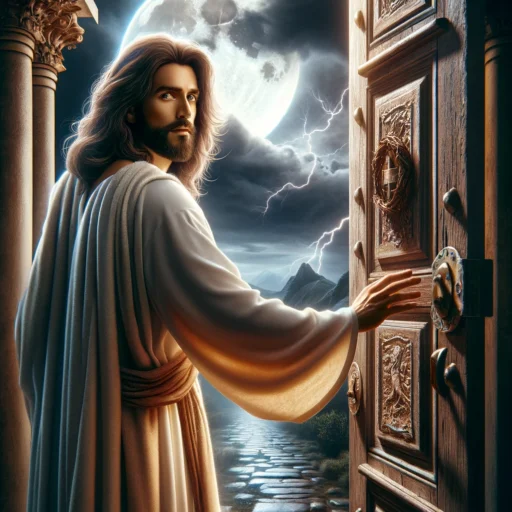It’s very enlightening to look at the instances where children are used to help portray and or emphasize different circumstances or feeling of hope, back in Isaiah’s day. Examining the context helps derive core meanings of the passages.
In the Book of Isaiah, children play an important symbolic role in several key passages. They often serve as signs or symbols of God’s promises, warnings, or the future of the nation of Israel. Here are the main places in Isaiah where children are used to signify something important:
- Shear-Jashub (Isaiah 7:3)
-
- Name Meaning: “A remnant shall return.”
- Significance: Isaiah’s son, Shear-Jashub, is a living symbol of the hope that a faithful remnant of Israel will survive the coming destruction and exile. The child’s presence alongside Isaiah when he meets King Ahaz serves as a sign of God’s promise to preserve a remnant of His people.
- Immanuel (Isaiah 7:14)
-
- Name Meaning: “God with us.” Compare the chapters on Bible Names and Their Meanings and Isaiah 9:6-8.
- Significance: The child referred to as Immanuel is a sign given to King Ahaz, indicating that before the child is old enough to know right from wrong, the threat from the neighboring kingdoms of Israel and Syria would be removed. The child symbolizes God’s presence and protection over Judah during a time of political crisis.
- Isaiah 7:13-16, 21-22 (GNT):
13 To that Isaiah replied, “Listen, now, descendants of King David. It’s bad enough for you to wear out the patience of people—do you have to wear out God’s patience too? 14 Well then, the Lord himself will give you a sign: a young woman[a] who is pregnant will have a son and will name him ‘Immanuel.’[b] 15 By the time he is old enough to make his own decisions, people will be drinking milk and eating honey.[c] 16 Even before that time comes, the lands of those two kings who terrify you will be deserted.
21 “When that time comes, even if a farmer has been able to save only one young cow and two goats, 22 they will give so much milk that he will have all he needs. Yes, the few survivors left in the land will have milk and honey to eat.
Footnotes for Isaiah 7:14-16 (GNT):
Isaiah 7:14 [a] The Hebrew word here translated “young woman” is not the specific term for “virgin,” but refers to any young woman of marriageable age. The use of “virgin” in Mt 1.23 reflects a Greek translation of the Old Testament, made some 500 years after Isaiah.
Isaiah 7:14 [b] This name in Hebrew means “God is with us.”
Isaiah 7:15 [c] These foods were associated with the earlier days of Israel’s history.
3. Maher-Shalal-Hash-Baz (Isaiah 8:1-4)
-
- Name Meaning: “Swift is the booty, speedy is the prey.”
- Significance: Isaiah’s second son, Maher-Shalal-Hash-Baz, serves as a prophetic sign of the swift destruction that will befall the enemies of Judah, specifically the northern kingdom of Israel and Syria. The child’s name is a warning that these enemies will soon be plundered by the Assyrians.
- Isaiah 8:1-4 (GNT):
The Lord said to me, “Take a large piece of writing material and write on it in large letters: ‘Quick Loot, Fast Plunder.’ 2 Get two reliable men, the priest Uriah and Zechariah son of Jeberechiah, to serve as witnesses.”
3 Some time later my wife became pregnant. When our son was born, the Lord said to me, “Name him ‘Quick-Loot-Fast-Plunder.’ 4 Before the boy is old enough to say ‘Mamma’ and ‘Daddy,’ all the wealth of Damascus and all the loot of Samaria will be carried off by the king of Assyria.”
- Isaiah 8:18 – Isaiah and his Children as Signs
-
- Verse: “Here am I, and the children the Lord has given me. We are signs and symbols in Israel from the Lord Almighty, who dwells on Mount Zion.”
- Significance: Isaiah explicitly declares that both he and his children are meant to serve as signs from God to Israel. The names and existence of Isaiah’s sons are symbolic of different divine messages—hope, judgment, and God’s continued involvement in the fate of the nation.
- The Child of Isaiah 9:6-7 (9:5-6 in Hebrew)
-
- Significance: This famous passage refers to a child who will be born, and the government will be on his shoulders. He will be called “Wonderful Counselor, Mighty God, Everlasting Father, Prince of Peace.” This child is often understood as a future ideal Davidic king who will bring peace and justice. In Christian interpretation, this child is seen as a messianic figure, but in Jewish interpretation, it may refer to a historical figure, such as King Hezekiah, or an ideal future ruler.
- The Child in Isaiah 11:6-9
-
- Significance: This passage is part of the vision of the “peaceable kingdom,” where the wolf will live with the lamb, and a child will lead them. In this idyllic future, the innocence and vulnerability of a child leading wild animals symbolize the coming era of peace and harmony under the ideal ruler from the line of David.
- The Child in Isaiah 66:7-9
-
- Significance: In this passage, a child is used metaphorically to describe the sudden and miraculous rebirth of the nation of Israel. Zion is described as giving birth to a nation without labor, symbolizing the rapid restoration and growth of Israel after exile. The child represents the future and hope of the nation.
Summary:
Isaiah often uses children as symbols to convey God’s promises and warnings. His own children, with their prophetic names, serve as signs of judgment and hope. Other passages use children to symbolize innocence, peace, or the future restoration of Israel.
